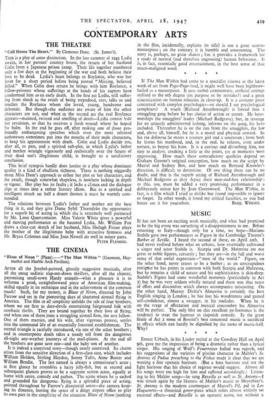CONTEMPORARY ARTS
THE THEATRE
"Call Home The Heart." By Clemence Dane. (St. James's).
THIS is a play of some distinction. In the late summer of 1945 Lydia awaits, in her parents' country house, the return of her husband Colin from a Japanese prison camp. Their life together numbered only a few days at the beginning of the war and both believe their love to be dead. Lydia's heart belongs to Roylance, who was her lover for a short period before being posted " Missing, believed killed." When Colin does return he brings with him Roylance, a fellow-prisoner whose sufferings at the hands of his captors have condemned him to an early death. In the first act Lydia, still suffer- ing from shock as the result of being torpedoed, sees, talks to and touches the Roylance whom she loved, young, handsome and debonair. But though.the audience are aware of him the other characters are not, and when in the second act the real Roylance appears—maimed, twisted and smelling of death—Lydia cannot hide her revulsion, so that he receives a fresh wound where he hoped for balm. In the end he goes off, after making one of those pro- foundly embarrassing speeches which even the most talented authoresses sometimes put into the mouths of their male characters, to keep his appointment with death. Colin and Lydia decide not, after all, to part, and a spirited sub-plot, in which Lydia's father and mother wrangle vigorously and realistically over the future of their dead son's illegitimate child, is brought to a satisfactory conclusion.
This brief synopsis hardly does justice to a play whose dominant quality is a kind of ebullient richness. There is nothing niggardly about Miss Dane's approach to either her plot or her characters, and the result, though somewhat shapeless, is nowhere lacking in depth or vigour. Her play has its faults ; it lacks a climax and the dialogue slips at times into a rather literary idiom. But as a spirited and intelligent attack on half a dozen themes it must be warmly com- mended.
The relations between Lydia's father and mother are the best thing in it, and they give Dame Sybil Thorndyke the opportunity for a superb bit of acting in which she is extremely well partnered by Mr. Leon Quartermaine. Miss Valerie White gives a powerful and moving performance as the haunted Lydia, Mr. William Fox draws a clear-cut sketch of her husband, Miss Shelagh Fraser plays the mother of the illegitimate baby with attractive firmness and Mr. Bryan Coleman and Miss Joan Newell do well in minor parts.
PETER FLEMING.


































 Previous page
Previous page